



Personal blog of christian
writer & fallible mom
Katy McKenna Raymond
in Kansas City, Missouri
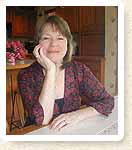
Katy is represented by
Greg Johnson at
WordServe Literary

Read more Katy at
LateBoomer.net
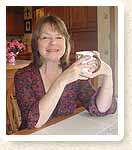
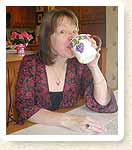
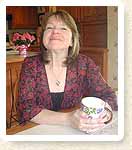
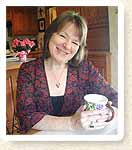
Author, Author!
I’ve got a fun treat for you folks today.
 It’s been my joy to be friends with author Nancy Moser since the moment we met at a writers group in Kansas City, I don’t know—maybe twelve years ago. If you don’t know about Nancy and her wonderful books, you’re missing out. I want better for you!
It’s been my joy to be friends with author Nancy Moser since the moment we met at a writers group in Kansas City, I don’t know—maybe twelve years ago. If you don’t know about Nancy and her wonderful books, you’re missing out. I want better for you!
I hope you’ll feel a part of my conversation with Nancy so much that you’ll leave a comment on this post. (Hey, ask her a question! She can deal!) From the commenters, I’ll choose one fortunate fallible reader who’ll receive a free copy of either Mozart’s Sister or The Good Nearby—your choice. Even if you won a book here just last week, you still qualify. That’s the kind of fallible blogger I am!
Katy: Nancy, tell us a bit about how you got into writing. You have a degree in architecture, right? How did you get from there to here?
Nancy: I’ve always loved to write, but life got in the way. I’m sure many writers can relate to that one. My husband also graduated in architecture, and there were few jobs in that market, so I let him go that route and I took other jobs. Then we had three kids and started a subcontracting business, where I learned accounting by just doing it!
Katy: Eeeeeewwww. I keep accounts for our corporation, too. But somehow I still don’t think I’ve learned accounting. Hmmm….I digress, huh?
Nancy: Indeed. Anyway, I still wrote on the side. I started out trying to write children’s books (thinking that would be easy) but got no where. I’m way too wordy! Then I wrote short humor essays that did get published in various magazines.
Katy: If I remember right, the night we met you’d just had a humor article published in Good Housekeeping. I thought that was amazing—heck, I still think so.
Nancy: Eventually, lots of those published articles were compiled into three books of inspirational humor (“Save Me, I Fell in the Carpool†is one.) But during all this noodling, I was also writing novels.
Katy: Is there such a thing as low-carb noodling? Maybe this is where I’m going wrong…
Nancy: I noodled my way through five novels for the secular market, basically learning how to write as I wrote. And rewrote. And rewrote. I can’t number the rejections I received! But in 1995 I had a God-moment that led me closer to Him, and changed the direction of my writing. Since then, I’ve had 15 inspirational novels published. So I guess that proves that once you get on the road He has for you, things start happening. In retrospect, I’m so thankful for all those initial rejections. Without them, I would never have found the right road.
Katy: A writer’s habits seem to hold endless fascination for us. A lot of readers and wannabe writers picture an attic garret, albeit one with central air in the summer, but still. Do you keep a set schedule? Are you what they call a seat-of-the-pants writer, or do you have everything plotted out and outlined before you start? What about writing tools? PC or Mac? Ballpoint or fountain? Palm Pilot or Alphasmart?
Nancy: Since I now have deadlines (which is a good thing), I have become very organized. My novels are generally 95,000-105,000 words. So when I get a contract and a deadline, I print up calendar pages from the present to the due date, and with a highlighter mark the weekdays available for writing (taking out vacations, weekends, known busy days, etc.) That gives me a true idea of how much time I have to write the book. Then I keep out a week at the end to reread everything, add up the days, divide them into 95,000, and find a daily word count number as my goal.
Katy: I’m getting dizzy. That’s a lot of math. Or accounting. Or one of those other skills I haven’t learned.
Nancy: For my current book on Jane Austen, I’m writing 1400 words per day. But with “Mozart’s Sister†it was only 750. I get up early (about 5), do my email and other computer junk, and make myself start writing at 8 (if not before.) I sit in the chair (except for coffee and potty breaks) until I’ve got my quota.
Katy: You take potty breaks? Just kidding.
Nancy: Ah. I generally write 500-600 words an hour, though that can obviously vary greatly. So you see, I only write mornings. I’m usually done by 11:30. I write weekend mornings, too, but those are bonuses. And in the afternoons and evenings I am free to live the rest of my life. Yet I admit I’m always thinking about writing. It never truly leaves me.
Katy: Favorite tools of the trade?
Nancy: I use a PC, and an Alphasmart (I love this thing!) I have an office in the basement with a lovely view (I have come to adore “viewsâ€) and sit with the keyboard in my lap, and my feet up on a milk-stool. And yes, I admit to being a seat-of-the-pants writer for my contemporary novels. Though as the novels progress, I do get clues about where they are going and certainly write those ideas down, which I suppose is a form of outlining. Just not up front.
Katy: Until recently, you’ve written all contemporary women’s fiction, right? And now….what?
Nancy: Historicals…a whole new ball game. I’m fictionalizing the life of a real person, which involves a ton of research. I do a lot of prep work for those books, and generally find one biographer I really love and read the book clear through, making copious notes in the margins, and marking possible “scenes.†Then I transcribe the notes to my computer, put the “scenes†in chronological order, and begin. The writing is the easy part!
Katy: Spoken like a true pro.
Nancy: While I’m writing, I have 3-4 reference books open at all times, getting many takes on a particular moment in the subject’s life. I also footnote my manuscript for the use of myself and my editor (it’s important to remember where I’ve found a piece of information.) When I can use the subject’s own words (usually taken from letters), I do. I love that. And of course the footnotes are removed in the final manuscript.
Katy: If you could give aspiring writers one piece of advice besides the obvious BOC (butt on chair), what would it be? Or is the obvious obvious for an obvious reason? :)
Nancy: BOC is essential. Even if it’s only for 30 minutes a day. That adds up. When I had three kids I used to try to write with them running around me, being . . . kids. I started to resent them; they were keeping me from achieving my dream. Not a good thing. That’s what got me started getting up so early. I needed to find a time when no one else was up! Now, with my first grandchild on the way (I just found out!) I’m still getting up early. Seven days a week.
Katy: You’re the youngest looking grandma I’ve seen in a while. Congrats!
Nancy: Thanks! The other piece of advice is to read good books and figure out why you like them. And on the flip side, don’t waste your time reading bad books (though perhaps figuring out why they are bad could be useful too.) If a book doesn’t grab me in 25 pages, I put it down. Keep that in mind with your own writing…
Katy: No offense, but when you say “keep that in mind with your own writing,” are you, like, referring to MY OWN WRITING?
Nancy: No offense taken. Yes.
Katy:Mozart’s Sister is a new writing venture for you, isn’t it? Can you tell us how the idea ever occurred to you? And isn’t it unusual to attempt historical fiction in first person, from the point-of-view of a known historical character?
Nancy: My old mantra was “I don’t do research. I hate research.†I never planned on writing historicals. But two years ago I was standing in Mozart’s house in Salzburg, Austria, and heard the tour guide say, “Some people don’t know this, but Mozart’s sister was just as talented as he was, but because she was a woman, she didn’t receive the same opportunities to use her talent.†I found this interesting and when I got home, I put it in the proposal for a contemporary novel I was putting together. I created a modern author who was writing a book called “Mozart’s Sister.â€
Katy: Sounds like a winner to me….
Nancy: I thought so, too. My agent sent the proposal out, and within a few days, I got a call from Dave Horton at Bethany House Publishers. “I don’t want the contemporary novel, I want Mozart’s Sister.†I told him, “But I don’t write historicals.†“I want Mozart’s Sister. First person. Her point of view.†“But I write third person, big cast novels.†“I want Mozart’s Sister.†“But I don’t do research.†It was like that.
Katy: Yikes!
Nancy: Because of Dave’s persistence and vision, I wrote “Mozart’s Sister†and found it the most satisfying and personally exciting book I’ve ever written. To give a woman-of-history a voice…I take the responsibility very seriously and try my hardest to do their lives justice. I am currently writing a fictionalized biography of Jane Austen’s life. I will say capturing Jane’s “voice†is a real challenge.
Katy: The research you did for Mozart’s Sister must have been extensive, because the sense of factual accuracy enhances the story line all the way through. Explain to us what kind of documents you used in researching to ground the story in reality. Was it difficult to find the documents you needed to create an accurate timeline of events, for instance?
Nancy: It was very difficult to find information about Nannerl Mozart, because all the books are about her brother, Wolfgang. When she is mentioned it is a part of his story. But luckily, the Mozarts were avid letter writers, and the father Leopold insisted that the letters were kept (he must have had some inkling how important they would be for future generations.) Those letters were invaluable, and often I was able to use quotes. I also found Nannerl’s diary—in German—and bought it, planning to have it translated. But then I found reference to it in other books, and they said it was disappointing because it offered no insight into her feelings, but was simply a “I went walking in the garden†type of diary. The timeline was not that difficult because of the letters. But there were stretches of time when events are unknown—especially when all the family was together in one place. No letters. No information. I did my best to fit the pieces together.
Katy: For some reason, I always imagine people in previous generations to be more compliant with the dictates of the society they lived in than we are today. Yet you portray a girl who is clearly not pleased with her “place,” which is always somehow secondary to her younger brother, Wolfgang. How common do you think it was in those days for a woman to yearn to use her God-given talents outside the sphere of her own home?
Nancy: I think women felt the urge to be all they could be, yet not to the same extent that we do now. It’s like a person who’s never tasted chocolate. They don’t yearn for chocolate because they don’t know how wonderful it is.
Katy: O taste and see that the chocolate is good…
Nancy: I know! Women of history had little freedom and few choices. That is the life they knew. I believe they had inklings of other life possibilities, but didn’t know how to make it happen, or even realize how good it might be. In fact, this phenomenon is one reason why it’s difficult for me to find subjects to write about. Generally, those few women who bucked the system to get what they wanted, did so with gusto. They were often scandalous women who had illegitimate children, affairs, and generally got in big trouble according to the eyes of society. Although their lives are certainly interesting, I choose to write about women who inspire and who achieved within the system. If any readers have ideas for another woman-of-history that might make a good subject, I’d love to hear from them: Visit my site or email me!
Katy: You know what? It would be just like fallible readers to come up with some great suggestions! Any other titles coming out soon?
Nancy: I have a book coming out at the end of October, “The Good Nearby.†It’s a contemporary novel about people searching for meaning and a girl who has the number 96 appear in her life over and over (what does it mean?) It involves being the “good nearby†in other people’s lives, seeing “the good nearby†in your own life, and knowing that God is “the good nearby†in all our lives.
Katy: Nancy, I gotta say it: You’ve personally been the Good Nearby to me in so many ways, for so many years. Thanks for your friendship, and for sharing your time with us here!
- I don't know exactly what you meant by asking a question and earning a book. Does that mean I can ask you a question here and if it's a good one then you will send me a book or if I go to her site and ask a question you deem 'good' then I will earn said prize?
Although I don't completely understand the rules of the game, here is my question (actually I have 2):
"How do you fit your theology into your writing?
In writing about historical figures how do you stay true to one such as Jane Austin who it is said was very particular about what she wrote?"Posted by Kcaarin Pineau on 10/08/06 at 01:45 AM - My question is...Why on earth do you love your alphasmart??? I used them MANY years ago with my students, and no one liked them very much. I hate that you can only see a certain amount of writing (very little) on the screen. Why don't you just use a laptop? (PS Any friend of Katy's is a friend of mine...I'm her "little" sis!)
Posted by Bridget on 10/08/06 at 02:24 AM
- Great interview, Nancy and Katy. Nancy, when you're writing your first draft, do you ever gett "stuck" in the middle of your story, and what's your method for getting past that?
Posted by Suzan on 10/08/06 at 10:12 AM
- Kcaarin--Sorry for being confusing! From the folks who leave any comment at all on this post, I will randomly choose one name to receive a free book written by Nancy. I write all the names of pieces of paper, shuffle them around, and draw one out.
Bridget--Ha! I had two Alphies and sold Nancy one. I let her tell you how she uses it.
Suzan--Nancy's away from her computer until tonight, but I sure want to know the answer to this one....Posted by Katy on 10/08/06 at 11:21 AM - I'm no writer (at least not at this point in my life) but I am a reader, and both of those books sound intriguing... especially Mozart's Sister. If I don't win one with my comment, I may just go out to Barnes & Noble and get a copy anyway!
Katy-- I chuckled at a lot of your little side-comments during the interview. They were even more funny when Nancy just continued on with the ongoing topic without seemingly taking any notice. I think things are sometimes funnier when people don't laugh if that makes any sense to you. (o:Posted by Pattie on 10/08/06 at 06:56 PM - To answer Mcaarin's question about theology in my books. I assume you mean in the historical bios I write, which are based on a real person's life. It's tricky, because the faith of past times was often based on ceremony and fear rather than personally knowing God. It was about praying rote prayers more than praying from the heart. So I take what I find out in history books and tweak it to offer some common point of spiritual seeking/surrender/knowing that modern readers can relate to. As for writing in Jane's voice when she was so "particular", I have immersed myself in her books and try to let that style seep into my brain (and hopefully out through my fingers.) But again, I have to tweak it a bit for modern audiences. Austen is not neccessarily an easy read because of her language choice so I simplify the archaic, while hopefully capturing the essence.
Posted by Nancy Moser on 10/09/06 at 12:01 PM
- Hey little sis, Bridget! I love my Alphasmart (which I DID buy from Katy!) because it weighs nothing and I can whip it on and off in a second. I went to Europe this summer and found in invaluable to take out on the bus and jot something in my diary, or notes from the trip. And in an airplane . . . so much easier to use than a laptop. 800 hours on 3 AA batteries is also a plus. I get tired of my laptop with its 2 hour battery limit! Yet I couldn't do without the laptop. The Alphasmart is a companion to the real computer, not a substitution.
Posted by Nancy Moser on 10/09/06 at 12:06 PM
- Suzan asked if I get stuck in the middle. Mired deep in sticky mud, my dear! It's a part of the process. Actually the first 1/4 of a book is the hardest because I don't know the characters. Once I get to know them and they take over the story, I can breathe easier. I'm quite willing to relinquish control to them! But when I do get stuck it helps to think "What's the worst thing that can happen to this person" and then make it happen! The good thing with my big-cast stories is that if I'm stuck with Joe's plotline, I can usually think of something to write on Mary's. A final piece of advice: if you get stuck on one scene, write ANY scene. Even the end. You don't have to write chronologically (though I usually do.) BTW, please know that there is no ONE way to write. You have to find what works for you.
Posted by Nancy Moser on 10/09/06 at 12:11 PM
- Pattie mentioned how in the interview Katy would give a witty aside and I would ignore her. Hey, how else am I going to keep on point? I don't dare let darling Katy's quips divert from my quest for a sane, chronological, halfway logical conversation. Sometimes I feel like George to her Gracie, though if you get us both going? Stand back. Quips at fifty paces! Last one standing gets the Krispy Kreme. :o)
Posted by Nancy Moser on 10/09/06 at 12:18 PM
- Nancy,
Love your current writing projects! Being a history buff, I've always enjoyed historical fiction, and your two projects look extremely interesting. Maybe I'll win one of Katy's copies!! For future options, have you ever considered Julian of Norwich or St. Teresa of Avila? Both were inspirational women ahead of their time, so to speak. I don't know much about them, but my good friend Sandi Glahn (aspire2.blogspot.com) has done some good research on Dame Julian for sure. Just a thought!Posted by Kelley Mathews on 10/09/06 at 01:06 PM - Nancy--How DARE you bring Krispy Kremes into this!!!!! :)
Kelley--This just in: The winner will be receiving a SIGNED copy of the book of her choice! And not signed by me, either..... ;) BTW, I am a graduate of St. Teresa's Academy for fine young Christian women in Kansas City. Teresa of Avila, not to be confused with Theresa of the Little Flower. Two TOTALLY different chicks. Fascinating suggestions for fiction, too!Posted by Katy on 10/09/06 at 02:45 PM - If I ask another question, do I get another chance at the drawing?!?!
Nancy, how do you stay motivated to write all morning long? I'm afraid that I would get distracted and find other things to occupy my time, especially if I was working at home. How do you stay focused?Posted by Bridget on 10/09/06 at 07:15 PM - Bridget asks how I stay focused while writing at home. It's tough. Especially if the writing isn't flowing. My goal every day is to escape into my writing enough that I forget the time and my fingers take off of their own accord. Those are the good days. The other days, I struggle. I may do a word count, realize I'm 400 words short of my quota and it's nearly 11 and I want lunch and . . . I just stay there until I've reached the quota. The need for food is a strong motivator. Uh oh. See how I've talked about donuts AND lunch on this blog. I'm on a roll. Ha! Roll! With lots of butter please.
Posted by Nancy Moser on 10/09/06 at 08:03 PM
- Dang, she's good! She can work the goodies into nearly every sentence! And SO MANY novels these days have a very strong chocolate thread woven through them. Chocolate and coffee and pastries. Oh, my....Mmmmm....sounds like a best seller!
Posted by Katy on 10/09/06 at 09:55 PM
- I do not know how authors do it. I went back to school to finish my degree and even getting out a two page paper seems the impossible task. The words are in my head but they become all humble/jumble on my paper.
How do you organize all the info to make sense? Do you use an outline.
And to keep the on task-wow! But I can see how you could get engrossed into the story line. I am a big reader and can get lost in a book, when I am procastinating on a paper(LOL).Posted by Amy on 10/10/06 at 01:30 AM - Amy asked about organizing ideas. For each book I have a computer file of notes--bulleted points. Remember, an idea is just air until you write it down! I also use little sticky notes on my desk to remind me of something that's immediate. But no, I don't have an outline, at least on contemporaries. With my historical bios, I of course have the framework of the subject's actual life, which is in essence, an outline. But most of all, I allow myself to make mistakes. Sometimes we get so engrossed in the process and what might be the "right" way, that we don't write. Just get something down. Fix it later. In my early writing years I once CUT 84,000 words from a manuscript! CUT 40% of the book. And I still go through extensive edits. I'm going through one now for "Solemnly Swear" (about a jury) which comes out next fall; a huge edit with my editors. You have to be willing to do this for the sake of the story. If you're not, you won't be published, or if published, won't get more contracts. Actually, editing is my favorite part. It's feedback. It's making it better.
Posted by Nancy Moser on 10/10/06 at 09:43 AM
- Nancy,
I love the archaic language! But I understand why you would simplify it.
I was listening to a lecture by Jerram Barrs on Jane Austin and he said that she really went over and over her words before chosing them. With that in mind I guess I was wondering how hard it is to get at her true voice. Are there many letters or a diary that help you to see her 'everyday' voice more clearly? I know that when I rewrite something over and over it is still my voice but much more modified than it would be if you were talking to me directly.Posted by Kcaarin on 10/10/06 at 03:42 PM - Ah, editing. As a middle school language arts teacher, I once wrote to a large variety of childrens' authors and asked them to tell my students the importance of editing. The responses were amazing! Some edit their books over 15 times before publication. They also talked about organization. One used sticky notes on a white board to outline the entire book, so he could move about the stickies as needed. Some authors used a laptop, some a desktop, some a typewriter, and some even handwrote their manuscripts. It was an interesting way to teach "real" writing to my students.
Posted by Bridget on 10/10/06 at 04:40 PM
- Mcaarin, re: Jane's voice. There are many letters from Jane to her sister, Cassandra, that have survived. When I can use extracts from those word-for-word, I do. As you stated, a casual letter voice is different from a voice used in a novel. I try to blend the two. I did the same thing with "Mozart's Sister", using the family's letters.
Posted by Nancy Moser on 10/10/06 at 08:02 PM
- Nancy,
(are you adding the 'M' to my name for a reason I cannot fathom? :) I have mulled it over and can't figure out the joke.....so jokes on me, please tell)
I am looking forward to reading your stories.Posted by Kcaarin on 10/11/06 at 07:33 PM - Kcaarin! With an "M"? I have no explanation except I saw it wrong once, and then typed it wrong twice. Truly bizarre! So sorry! I should probably make up some amazing excuse (I like to make up stories, you know) but am truly clueless. Scary.
Posted by Nancy Moser on 10/11/06 at 08:21 PM
- Kelley, thanks for the heads up about Julian of Norwich and St. Teresa of Avila. St. Teresa looks especially interesting because she had real spunk--not always easy back then. I will look into both of their life stories.
Posted by Nancy Moser on 10/11/06 at 08:33 PM
- Nancy, must be too much writing and starring at the computer screen! LOL!!
Posted by Kcaarin on 10/13/06 at 05:08 PM
Next entry: To The Nines
Previous entry: Mother Of The Fried
